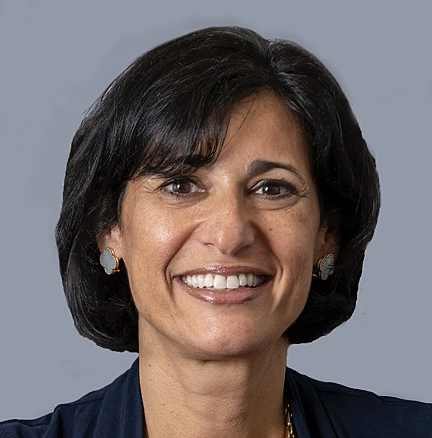
President Biden appointed Dr. Rochelle Walensky as the Director of the Center for Disease and Prevention. She took office on January 20, 2021.
Walensky is an expert on AIDS and HIV as well as virus testing, prevention, and treatment.
Doctors and public health experts widely praised the choice.
The position: Oversees federal efforts to protect against and respond to public health threats.
Rochelle Paula Walensky was born in Peabody, Massachusetts to Carol Bersoff-Bernstein and Edward H. Bersoff. She was raised in Maryland.
In 1991, Walensky received an AB in biochemistry and molecular biology from Washington University in St. Louis.
In 1995, she received an MD from Johns Hopkins School of Medicine.
From 1995 to 1998, she trained in internal medicine at Johns Hopkins Hospital.
Walensky then became a fellow in the Massachusetts General Hospital/Brigham and Women’s Hospital Infectious Diseases Fellowship Program.
In 2001, she earned an MPH in clinical effectiveness from the Harvard School of Public Health.
Walensky has been on the faculty of Harvard Medical School since 2001, first as an instructor, then as a professor.
Walensky was Chair of the Office of AIDS Research Advisory Council at the National Institutes of Health from 2014 to 2015 and has served as a member of the US Department of Health and Human Services Panel on Antiretroviral Guidelines for Adults and Adolescents since 2011.
She serves on the board of directors of Mass General Brigham.
She has been co-director of the Medical Practice Evaluation Center at Massachusetts General Hospital since 2011.
A highly respected researcher, Walensky has published nearly 300 papers, many focused on the cost-effectiveness of HIV interventions and aimed at improving patients’ care.
In 2019, she testified before a US congressional committee investigating the cost of PrEP drugs. She discussed her research showing why both HIV treatment and PrEP prevention were needed to end the HIV epidemic, and how the high cost of HIV drugs was an obstacle to care.
In 2020, Walensky became a trusted source of advice on COVID-19. She was appointed to Massachusetts’s COVID-19 Advisory Board in March.
Walensky helped to coordinate response efforts with other academic medical centres, and to convey their collective voice in opinion articles for newspapers to inform the public.
And she also published research with co-authors that supported the reopening of US college campuses only if people practised physical distancing and other preventive measures and had frequent universal routine mandatory testing.
“The general recommendations are that you can’t kind of test out of quarantine,” said Rochelle Walensky in October 2020. “If you are exposed and test negative on Day 3, that does not mean you won’t test positive on Day 6.”
In a paper published in Health Affairs in November 2020, Walensky and her co-authors showed that the effectiveness of a COVID-19 vaccine will be strongly affected by:
- The speed that the vaccine is produced and administered. Some of the potential vaccines have logistical challenges including the need for ultra-cold storage, or requiring two doses.
- The willingness of people to be vaccinated.
- The pandemic’s severity when the vaccine is introduced.[8]
She is involved in a medical discussion on the best strategy to combat the COVID-19 pandemic and achieve herd immunity.
One side of the discussion supports the Great Barrington Declaration which suggests “focused protection” on vulnerable groups, while allowing less threatened groups greater freedom from quarantine and other costly methods.
Walensky favors the John Snow Memorandum. She says that “The Great Barrington Declaration is predicated on the idea that you know who is going to get sick and you can somehow isolate and protect them, but there is absolutely no evidence that we can do this … No-one is suggesting that lockdowns should be the default position. They are a last resort. But if we just let the virus run free without mitigation strategies, such as masking, our hospitals will overflow and that would mean we would no longer be able to take care of the population’s health across the board”.
Walensky is married to Dr. Loren D. Walensky, a physician-scientist specializing in peptides (amino acid chains) and oncogenic pathways (how normal cells transform into cancer cells). They have three sons.
Walensky also serves as the administrator of the Agency for Toxic Substances and Disease Registry.
Walensky ‘s priorities include ensuring that CDC staff “will feel unmuzzled, and feel like the science is leading the way again.”
She also wants a review to confirm all COVID-19 guidance is evidence-based, and not tarnished by politics.
And when the USA gets through the pandemic, Walensky said “we will realize, unfortunately, that there’s been a massive amount of collateral damage to other health metrics related to COVID-19.”
“Some people have not had access to medical care, exacerbated by years of health inequities, and there is likely to be more uncontrolled hypertension, increased obesity, and missed pediatric vaccinations,” she said. “We know that the opioid crisis has only gotten worse and I know we’ve lost ground in the HIV epidemic, and mental health and suicide—there are so many things that the CDC needs to tackle.”